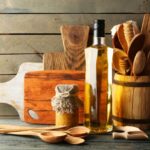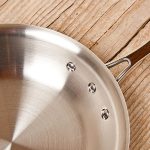Since ancient times, wood has been a popular option for cooking utensils, such as spoons and spatulas. Even today many people still prefer wood over other options, because of its aesthetics and functionality. Using wooden kitchen appliances offers several advantages over stainless steel or plastic kitchen appliances. Here are some of them:
- Wooden utensils will not leave scratches on your cookware. Wooden utensils are soft and very gentle on sensitive cooking surfaces. One of the key benefits of wooden spatulas is that they won’t scratch the surface of your nonstick pans. Plus, they won’t leave scratches on your cast iron or stainless steel pans and, unlike metal utensils, they don’t make any noise.
- Wooden spoons do not conduct heat. Another reason why wooden utensils are superior to metal utensils is that wood does not conduct heat. If you leave a wooden spoon in the hot pot for a long time, the handle will stay cool and you won’t need heat-resistant gloves to grip it. Using a metal spoon can cause burns to your hand. The plastic spoon will melt if you stir something hot or leave it on a hot pan.
- Wood is an inert material. Another plus is that wood is a non-reactive material and does not release harmful chemicals into your food. Wooden utensils don’t react with the acids in foods and don’t leave a metallic taste as metal spoons do.
- Easy to grip handles. Holding a metal spoon can be uncomfortable for you, while sharp edges can damage delicate ingredients. The wooden spoon handles are gently rounded and fit comfortably in the hand. You will feel comfortable and satisfied using it.
- Beautiful Design. Another advantage of wooden kitchen appliances is that they look attractive and elegant. The creative and artistic design of wooden utensils adds a beautiful accent to your kitchen. Handcrafted wooden spoons look like works of art, making them wonderful gifts.
- Durability. Wooden utensils are reasonably durable. As long as you care for them properly, you can expect them to last you long. They’re hard to break and you can stir even the thickest ingredients or scrape food from the bottom of the pan. They can withstand high heat and will not melt in an unattended pan. A little sanding from time to time can help remove burn marks and stains.
- Germs and bacteria don’t like wood. Research indicates that some woods (pine and oak) appear to have natural bacteria-killing properties. Germs and bacteria grow faster on plastic and metal surfaces than on wooden kitchenware surfaces.
- Wood is an environmentally friendly material. Environmentally conscious people can confidently choose wooden utensils. Wood is a natural and renewable resource, making it an eco-friendly choice for kitchenware. We can help protect the environment by using kitchen utensils made from renewable, biodegradable, and non-toxic materials.
The Disadvantages of Wooden Cooking Tools
Wooden kitchen tools do have a few downsides:
- Wooden utensils are more difficult to clean than stainless steel or plastic cooking utensils. Food residue easily sticks to the porous surface of the wood. Wood expands in water, so soaking wooden utensils in water should be avoided.
- Wooden utensils quickly lose their shine and can become splintered or cracked if not washed or treated properly.
- Wooden spoons tend to leave stains when used to cook soups and sauces.
- Sometimes it can be difficult to determine whether the shiny finish of your new wooden appliance is food-safe, especially for items brought from abroad. That shiny surface wears off as you use it, and you don’t want harmful substances leaching into your food. To be on the safe side, always buy wooden cooking utensils from reputable manufacturers.
Wooden Cooking Utensils Sets
This post contains links to Amazon. The publisher may get paid if You purchase something through the links without additional costs to You.
- Wooden House Wooden Cooking Utensils13 pieces (Made of natural teak wood and include a spoon rest)
- Tmkit Healthy Cooking Utensils Set (nicely polished and comes with storage wooden barrel)
- Wooden Spoons for Cooking by Gudamaye (Includes spurtles that are excellent for stirring and scrapping)
You may also like:
What are the Best Cooking Utensils for Non-stick Cookware?




Thanks for the tips. I really like that wood does not put any toxic chemicals into my food. That is why I do not like to use plastic as much. I worry that it could be leaving chemicals in my food.
I love cooking with wood too, surprisingly. Wooden utensils are great, and so cheap! Great tips.
Good stuff of information. Thanks for sharing.
Another advantage of using kitchen tools is they sound good.
Hi, I love wooden kitchenware and I always try to purchase wooden if I have a choice between plastic and wood. Your post perfectly highlights the advantages of wooden kitchen tools.
Thank you for sharing such a helpful article. I personally feel that wooden utensils are always the best for my kitchen. Recently i also found an amazing website- IRONWOOD GOURMET that sells the best quality of wooden kitchen ware. All their products are made up of Acacia wood that not only looks stunning but has an anti-bacterial quality to it. Please do check their website, I am sure you are going to love it.
https://ironwoodgourmet.com/
Why not link to this research that “proves” wood is anti-germ? I don’t remember when I last saw hospitals and commercial kitchens using wooden instruments and surfaces. Oddly, they use metal, which can actually be sanitized. I suspect that they’d be very interested in this research that shows a less expensive material might actually be better at preventing disease.
I also suspect that the research doesn’t exist.